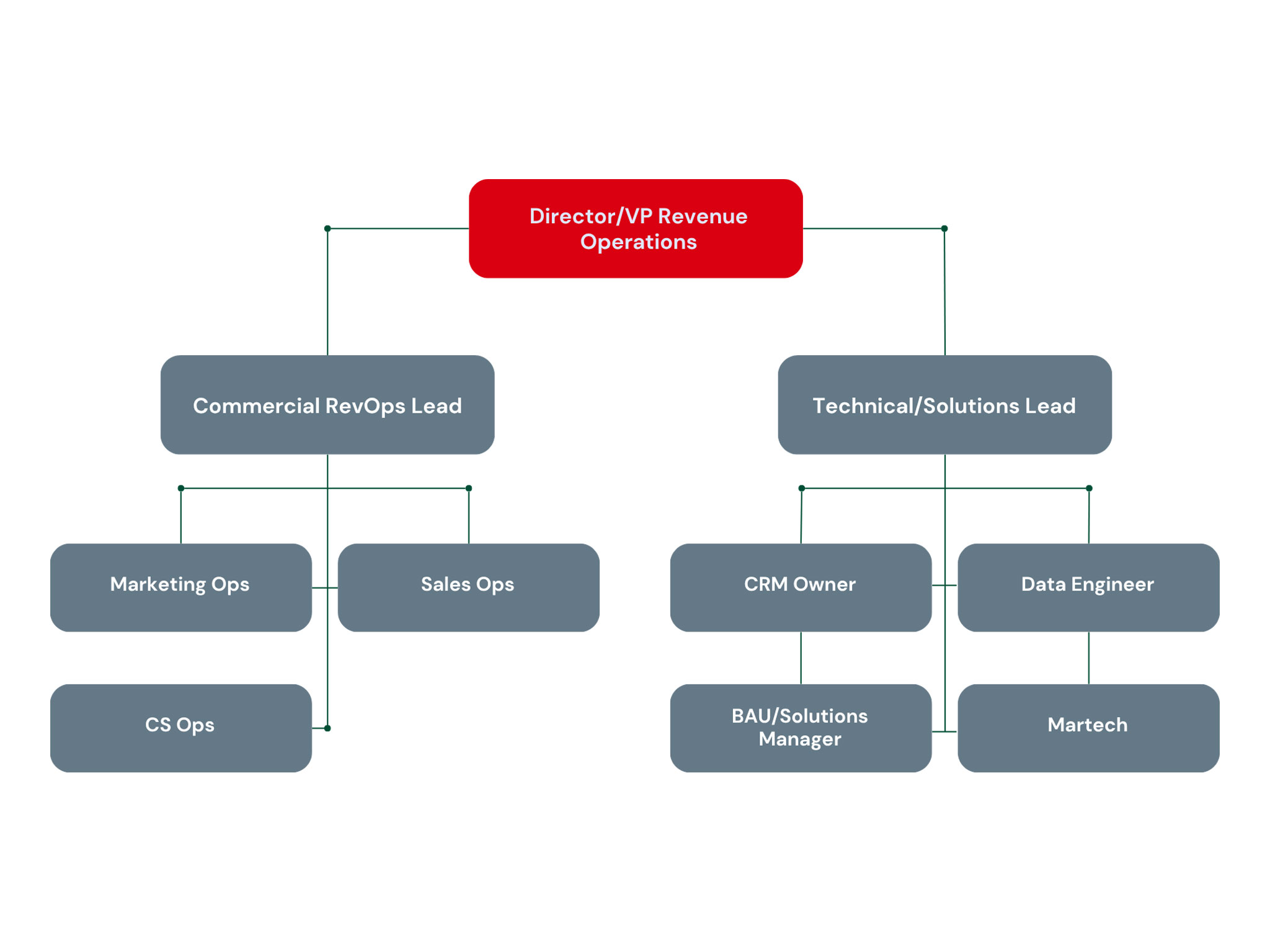How – and why – to build a impactful revenue operations function
- Running a business
- Article
- 5 minutes read

Revenue operations is, at heart, the science of understanding how a company makes its money, and the most important job of RevOps professionals is to make it easy for the revenue-generating teams of an organisation to do their jobs to best effect. For Sandro Berchier, Head of Operations and AI at Swiss scaleup Ledgy, the goal of the revenue operations function is to:
Sandro Berchier, Head of Operations and AI at Swiss scaleup Ledgy"Unify and break down silos between sales, marketing and customer success teams, through shared data, aligned processes, and common metrics that drive predictable revenue growth."
RevOps is a relatively new discipline. Part of the reason for its emergence was down to the amount of customer and prospect data being generated by tech companies, especially in the software-as-a-service (SaaS) sector. “Fast growth almost always creates new friction,” says Sarah Caulker, Head of Sales and Partnerships at revenue operations consultancy RevQore. “RevOps is perceived as the best way to untangle complexity in companies that have grown quickly but chaotically.”
These frictions often involve back-and-forth between different commercial teams to determine who gets how much credit for different deals and campaigns. RevOps is conventionally the company’s ‘source of truth’ for all commercial data. But the remit of a RevOps team can extend well beyond data; for instance, many RevOps teams are obtaining responsibility for assessing and testing AI tooling that could potentially add value to the GTM function.
Although RevOps began life in software companies, Sarah now observes companies from different industries exploring the potential added value of a more coherent approach to systems and processes in their commercial functions. “While 90 percent of our client base is still SaaS, we are seeing more interest from companies in defence, energy and infrastructure.”
And investors are increasingly interested in RevOps as a solution to operational challenges in more mature businesses. “We work on a lot of post-merger integration projects in private-equity backed companies, where leaders need to stitch different systems together and create a new source of truth for a combined organisation,” says Sarah.
Sarah Caulker, Head of Sales and Partnership, RevQore"We’ve seen businesses operating with more than 20 different sales and marketing systems. Those headaches create a clear business case for revenue operations to streamline the tooling and processes being used."
From the name alone, it might seem to make sense for revenue operations to sit within the revenue-generating side of the business. And often, RevOps does report into the Chief Revenue Officer (CRO). “In my experience, at least in more mature scaleups, this is a common reporting line,” says Richard Standring, Revenue Operations Lead at payments platform Payhawk.
However, many (perhaps most) early-stage startups don’t often have a CRO in place. So what are some sensible alternatives? In very early-stage companies, revenue operations may well report into the CEO or a co-founder. And in Sandro’s view, the RevOps function also works well when it reports into the Chief Financial Officer (CFO):
Richard Standrin, Revenue Operations Lead, Payhawk"It’s important for RevOps to have some independence from the different commercial teams, as one function of a good RevOps function is to help resolve any disagreements between sales and marketing on issues like deal attribution and customer handovers."
If accountability for RevOps sits with the CFO, the function may retain more integrity and impartiality when resolving conflicts on deal attribution.
Sarah also sees the operational independence of a RevOps team as key to its effectiveness. “The crucial question is whether RevOps is empowered to apply their work across all functions. If RevOps is ‘owned’ by the Head of Sales, for instance, the risk is that the marketing and customer success teams might feel short-changed in terms of the attention paid to optimising their data and processes.”
“But as you hire more people, keep track of the time taken on commercial operations. Once the time your GTM teams are collectively spending, say, 50 hours each week on their ops, tooling and processes, it becomes easier to make the case for a RevOps hire,” Richard says.
So how do founders allocate resource once the decision is made to establish a revenue operations function? As the early GTM team starts to scale, startups will often bring on board one or two people whose roles naturally gravitate towards data and reporting. Often, those individuals will be focused on a specific part of the GTM engine (working exclusively for the sales or marketing teams), or on general operations. The decision for founders and senior leaders is how to combine those resources.
Founders and revenue leaders will face a complex decision at some point: should the individuals responsible for a department’s commercial processes and data ‘stay in their lane’ and focus on sales operations, marketing operations and so on, within the RevOps umbrella? Or should there be a concerted effort to apply their work across GTM teams, prioritising breadth of knowledge and experience over domain familiarity?
To Richard, early-stage startups will be very unlikely to have the resource to accommodate a RevOps team of this size, “so you’ll need multidisciplinary RevOps people out of necessity. The choice will come later, but it can make sense to have dedicated team members dedicated to sales, marketing and customer success operations, once there is the budget. One way to make this structure work is to pair a domain-specific team member with someone within the team who does have a deliberate cross-departmental mandate, such as a business intelligence specialist.”
So what kind of team will a VP or director of revenue operations be leading at scale? After all, even in the early stages of a company’s development, senior leaders need to dedicate time to thinking about their org chart at maturity. This chart maps Sarah’s experience of a RevOps function at scale, “something like £100 million ARR”:

Credit: RevQore
In this model, the function is divided into commercial roles, where there are dedicated RevOps partners for the sales, marketing and customer success teams, and roles that support data, infrastructure and process change. At Payhawk, the commercial side of the revenue operations team is “empowered to act almost like product managers, scoping and resolving user needs – only the ‘users’ are salespeople or marketers,” says Richard.
While early-stage founders don’t need to start building a RevOps team of this size, it’s helpful to keep in mind the skills required in a mature revenue operations function, and the degree of specialisation that becomes an asset at scale. “RevQore has built a quick way to test your revenue operations maturity. Understanding what you have to do to evolve the function as you scale is essential,” says Sarah.
For founders thinking about building out a revenue operations team, what traits set strong candidates apart? In Sarah’s view, it starts with a willingness to get your hands dirty.
Sarah Caulker, Head of Sales and Partnership, RevQore"An early hire will have to be a problem-taker initially and fight lots of fires, so that appetite for mess – as well as a really astute sense of how to prioritise – is absolutely key."
It’s certainly true that like any early employee in a startup, the first RevOps hire will need to operate with a high degree of autonomy. For this reason, Sandro recommends that the individual in question is “mid-level or relatively senior, but hands-on: someone who can build initially but then hire underneath them once the operation starts to scale.” If the right hire is proving hard to find, Richard suggests that “an experienced consultant, or fractional RevOps lead, can help companies solve their initial problems and lay the groundwork for a future full-time joiner.”
Revenue operations requires solid data knowledge and technical skill, but the role is far from one-dimensional. “An early RevOps hire will have to deal with a very broad mix of tasks, from high-level strategy through to low-level implementation work. One of the key components is the ability to manage up, and offer constructive challenges to senior stakeholders. So a mix of good soft skills and stakeholder management is really important,” says Sandro.
Sandro and Richard both have backgrounds in strategy consulting. What about consulting makes individuals well-suited for a role in revenue operations? “The combination of an analytical approach and stakeholder management skills, as well as the ability to prioritise effectively, are developed in consulting environments and are really key to performing strongly in a RevOps role,” suggests Sandro.
Revenue operations is an increasingly important part of commercial strategy, for early-stage businesses as well as more mature organisations. Different companies will have various approaches to the best position for RevOps in the org chart, and in the exact remit of the role during the early stages of a company’s development.
Early RevOps team members need a correspondingly complex set of skills, from technical understanding through to persuasion and constructive disagreement. As more AI systems become embedded into commercial processes, sales, marketing and customer success leaders need a coherent and effective way to integrate leading-edge technologies. In this context, the RevOps function is in a singular position to add value and shepherd GTM functions towards sustainable, impactful growth.